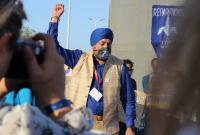Support strong Canadian climate journalism for 2025
Our planet is our only home, and it provides us with all the essentials for survival — the land we inhabit, the water we drink, the food we consume and the air we breathe. Despite this, our reliance on fossil fuels has brought our planet to the brink of collapse. Our planet, lands and oceans are suffering, and so are we.
Back in 1989 in Langkawi, Commonwealth leaders predicted the “permanent and irreversible damage” to the environment and demanded a co-ordinated global response. The world did not believe the warning. Their prediction came true. We have seen the consequences just recently with climate disasters in Vanuatu, Mozambique and Malawi.
Our planet is changing rapidly, from melting glaciers to bleached coral reefs. Over the past two decades, more than 7,000 major natural disasters, most climate-related, occurred across the world, claiming 1.2 million lives, affecting 4.3 billion people and resulting in $3 trillion in economic losses.
This represents a 75 per cent increase in the number of disasters and an 80 per cent increase in economic losses compared to the two decades before them. According to the United Nations, developing countries suffer 99 per cent of climate-related casualties.
The situation is particularly dire in the Commonwealth. Our 56 member countries, of which 33 are small states, are being hit on all sides by the destructive forces of climate change, the lingering consequences of the pandemic and the challenge of rising debt.
Each of these threats is seismic on its own, but together, they combine to form a lethal cocktail that amplifies existing social, political and economic inequalities, jeopardizing stability, resilience and development prospects. Millions of people’s lives and livelihoods are being affected. But they are fighting. We must, too.
There is no question about how climate vulnerability is driving up the cost of capital and posing a grave threat to debt sustainability. Even if a country is financially prudent, a single disaster can wipe out most of its GDP, plunging it from a middle- or low-income country to a no-income one.
That country then has to borrow more to rebuild — at interest rates much higher than they would otherwise be due to its vulnerability. Recent figures show that the least developed countries borrow only half as much as developed countries, but spend three times more on interest payments. The higher cost of capital further impedes their ability to invest in long-term resilience and sustainable development.
Vulnerable countries, which have contributed the least to climate change, are paying twice for the damage endured during disasters and through higher costs of capital they have to borrow to rebuild. As a result of these and other factors, 60 per cent of vulnerable countries are in debt distress or at high risk of it. This is unjust and morally unconscionable.
We simply cannot stand by and watch vulnerable countries either being engulfed by rising seas or choked by crushing debt.
The Commonwealth has been bold and consistent in its leadership and practical support on these issues. We were instrumental in the success of the heavily indebted poor countries initiative and just last year, the call from the 2022 Commonwealth Heads of Government Meeting for more action on loss and damage was a catalyst for the new fund agreed upon at the Sharm el-Sheikh Climate Change Conference (COP27) months later.
But our work alone is not enough. To address climate change and achieve net-zero emissions by 2050, $4 trillion is needed every year by 2030. But climate finance flows in 2021 reached only $630 billion.
This requires bold and urgent action from a wide range of stakeholders and sources on reforming the global financial architecture to deliver more funding for vulnerable countries, on considering vulnerability when lending development finance and on debt restructuring, including through large-scale debt-for-nature swaps.
To create truly meaningful change, we must move beyond the narrow analysis of GDP as a criterion for assessing eligibility for support to a more nuanced understanding of broader factors that tend to amplify vulnerability and diminish resilience. In this regard, the Commonwealth’s Universal Vulnerability Index provides a solid basis to better target support for those who need it most.
We know investing to deliver finance to vulnerable countries will build resilience and create virtuous circles of sustainable growth and opportunity for everyone, everywhere.
It is imperative to recognize that no individual nation can tackle the climate crisis alone. It is our shared responsibility to work together to prevent a global societal collapse while we still have time. The opportunity to act is rapidly diminishing. We can no longer afford to make incremental progress. Urgent and substantial change is necessary — and it must happen now, not tomorrow.
Patricia Scotland is secretary-general of the Commonwealth. She was born in Dominica and is the first woman to hold the post.






Comments